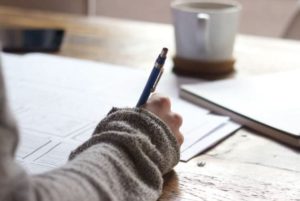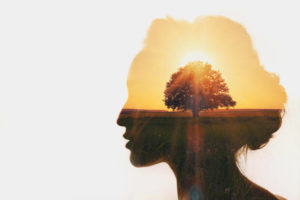As I opened an email titled “Congratulations! Your dissertation is approved.” I felt tears of happiness slowly running down my cheeks. I smiled, closed my eyes, and took a long, deep breath. It had been a long and difficult journey, but somehow, I felt that it was only a beginning – of a new era, the one where I officially had no reason to doubt myself. “I am a doctor now,” I thought to myself. “I did it, I proved them all wrong.”
For as long as I can remember I was told that I wasn’t good enough and compared to those around me who did everything better – read better, spelled better, spoke better. With my learning disability, it took me decades to make peace with the fact that I wasn’t worse than others, but that I was just different. Even after I started my own training company, during one of my first sessions someone pointed out to me that I misspelled a word in front of dozens of people whom I was training. I brushed it off, laughed, and corrected it, but deep down I was hurt. It surprises me that to this day we measure people’s intelligence with how well they can spell. Well, I am here to tell you that I run a successful business and I just finished my doctorate, and I am a terrible speller. I hope a small self-conscious kid out there reads this and realizes that to be happy and successful, one doesn’t need perfect spelling skills. I am not saying you shouldn’t learn how to spell, I am saying that if you struggle as much as I do with the written word, perhaps there are other skills that you can and should develop instead of beating your head against the wall trying to do what you are terrible at. We have an autocorrect for a reason, so we can focus on other things that matter – expressing who we are through deep creative work.
 Looking back at the last five years, I wanted to understand how I managed to do what I did and share it with the world. I was running a full-time business on my own while getting my Ph.D. (also full-time). I juggled between operations, training, marketing, managing my books, and reading scientific papers. Many times throughout these years I thought I wouldn’t make it, but I somehow made it every time. This past year with the pandemic was perhaps the hardest I’ve had in a long while. I was re-organizing my company’s operations, re-staffing, launching a new product while delivering trainings and conducting my dissertation research all in the midst of the pandemic that hit the field of education I am operating in the hardest. I was facing the challenge of paying the bills and payroll when we were not making the same amounts of money as in previous years, so I had to think fast and adapt. I took all of our educators’ trainings online and quickly developed an online product for young people. We did a 180 shift. The fact that we survived and came out of it holding our heads high is pure tenacity and focus. And I am grateful to my team, our hard work and the systems and practices I have established. Considering the year we’ve all had, I am sure many of us could use some support in managing stress. Here’s a great resource on “Managing Emotions in Times of Uncertainty and Stress,” the course by Dr. Marc Brackett.
Looking back at the last five years, I wanted to understand how I managed to do what I did and share it with the world. I was running a full-time business on my own while getting my Ph.D. (also full-time). I juggled between operations, training, marketing, managing my books, and reading scientific papers. Many times throughout these years I thought I wouldn’t make it, but I somehow made it every time. This past year with the pandemic was perhaps the hardest I’ve had in a long while. I was re-organizing my company’s operations, re-staffing, launching a new product while delivering trainings and conducting my dissertation research all in the midst of the pandemic that hit the field of education I am operating in the hardest. I was facing the challenge of paying the bills and payroll when we were not making the same amounts of money as in previous years, so I had to think fast and adapt. I took all of our educators’ trainings online and quickly developed an online product for young people. We did a 180 shift. The fact that we survived and came out of it holding our heads high is pure tenacity and focus. And I am grateful to my team, our hard work and the systems and practices I have established. Considering the year we’ve all had, I am sure many of us could use some support in managing stress. Here’s a great resource on “Managing Emotions in Times of Uncertainty and Stress,” the course by Dr. Marc Brackett.
When I think about more concrete examples of how I managed to complete my Ph.D. program while running a full-time business, I realize that I started creating systems and habits around my lifestyle that supported me and helped me succeed. I myself struggled with the traditional education system that required memorization of information and following outdated methods of teaching, so I implemented new methods to my own studying and when developing my education products. The traditional education system requires you to sit down, read and highlight an article. With my busy schedule and my learning disability, I knew I could not possibly follow a traditional path. I didn’t have the time and the skills for that, so I adapted. I got an audio system and programmed it to read the articles to me and highlight the key points that I needed. I also got a recorder that I used for the first drafts of my papers and my dissertation. My mind works so fast that I simply cannot write my thoughts down on paper, so I record my voice, then take a day or two before coming back to process my recordings. This gives me time and space to work out a concept in my head and when I return to my original thoughts that were recorded, I am able to put them together in a logical order. Finally, I use a whiteboard where I record all my ideas, plans, and quick thoughts that need attention, which also helps to keep things in order.
 Self-awareness was perhaps the most important thing for me throughout this process. Over the years of my inner work, I developed my emotional intelligence and understood my emotional and educational needs. I made a connection between my emotional intelligence and developing my self-discipline and confidence, which led to the understanding that I had something to contribute. Now I know that I have something to offer to the world, I didn’t know it back then. This realization gives me so much strength to persevere when things get hard, to not give up, to pursue my dreams, and to make a difference. Self-discovery was another important aspect of my journey. Slowly I started believing in myself and my intelligence. I started paying less attention to what I couldn’t do, and more attention to what I could do, developing my strengths rather than letting my weaknesses bring me down. No one has it all, we are better at some things and worse at others. Our brilliance lies in our strengths, we must never forget that and teach our children to focus on their strengths. Some of us are more visual and think in images rather than words. Some learn by audio, others by touch, others yet by experience. When we understand who we are and what type of learning works best for us, we open ourselves to a myriad of opportunities. The purpose of iDEAS Empowered by Youth, the new product that I launched this year (project-based learning for children and youth) is to help young people develop self-awareness and self-discipline by guiding them to discover their talents and pursue their passions. I stand behind my work because I experienced the beauty and the magic of the method that I use firsthand.
Self-awareness was perhaps the most important thing for me throughout this process. Over the years of my inner work, I developed my emotional intelligence and understood my emotional and educational needs. I made a connection between my emotional intelligence and developing my self-discipline and confidence, which led to the understanding that I had something to contribute. Now I know that I have something to offer to the world, I didn’t know it back then. This realization gives me so much strength to persevere when things get hard, to not give up, to pursue my dreams, and to make a difference. Self-discovery was another important aspect of my journey. Slowly I started believing in myself and my intelligence. I started paying less attention to what I couldn’t do, and more attention to what I could do, developing my strengths rather than letting my weaknesses bring me down. No one has it all, we are better at some things and worse at others. Our brilliance lies in our strengths, we must never forget that and teach our children to focus on their strengths. Some of us are more visual and think in images rather than words. Some learn by audio, others by touch, others yet by experience. When we understand who we are and what type of learning works best for us, we open ourselves to a myriad of opportunities. The purpose of iDEAS Empowered by Youth, the new product that I launched this year (project-based learning for children and youth) is to help young people develop self-awareness and self-discipline by guiding them to discover their talents and pursue their passions. I stand behind my work because I experienced the beauty and the magic of the method that I use firsthand.
Perhaps it’s time for us all to begin to focus on developing our strengths rather than trying to correct our weaknesses. Perhaps it’s time to let our children develop their talents and pursue their interests instead of stressing over them getting good grades. Perhaps it is also time for us to establish practices and systems that help us develop confidence and self-awareness and allow us to shine, so we can show a good example to our children – of how to live the life of meaning and purpose, and, as the one and only Maya Angelou put it, to “not merely survive, but to thrive.”
For breakfast, I had Bustello Coffee and a green shake.
Author: @soniatoledo
